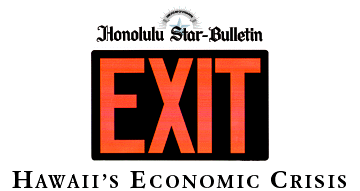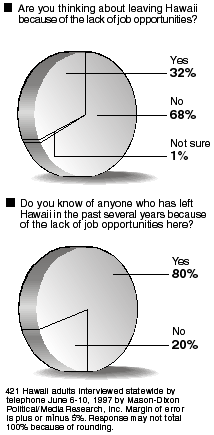

By Ken Sakamoto, Star-Bulletin
Workers at the Crazy Shirts T-shirt factory on Iwaena Street will lose their jobs when the company moves its headquarters and Halawa plant to California next year.
Multimillion-dollar
exodus
Struggling firms take jobs and capital
By Rick Daysog
out of Hawaii, in search of growth
opportunities -- or survival
Star-BulletinIt made a lot of business sense. The mainland market was growing, they needed to cut costs and Hawaii's economy is struggling. But executives at Crazy Shirts Inc. said they agonized for months over their decision to lay off 140 local workers and relocate their Halawa manufacturing plant and company headquarters to Orange County, Calif.
"It was an extremely tough decision," said Randy Yeager, senior vice president and general manager at Crazy Shirts. "We've looked at this alternative in the past but always stopped because of the impact on our people. This is something that we wanted to avoid at all costs."
But such moves are becoming more common these days in Hawaii's slow-growth economy.
With the sluggish business climate of the past five years, isle companies like Crazy Shirts are consolidating some of their functions to the mainland to control costs.
Others are counting on their growth to come from the mainland and Asia-Pacific markets. Some are just leaving.
The companies and organizations looking elsewhere represent a cross-section of the state's economic engine; from small accounting offices to the state's biggest banks, from cement makers to Hawaii's largest private landowners.
And it comes at a time when Japanese investors -- who poured some $18 billion into Hawaii's economy during the late 1980s and early 1990s -- are pulling out of hundreds of millions of dollars in investments here.
"What we're looking at here is an economy that's taken some body blows and it's reeling from it," said Lawrence Boyd, labor economist at the University of Hawaii's Center for Labor Education and Research. "Naturally, people are moving out and checking new opportunities. That's the nature of markets."
Easier to make a buck elsewhere
The problem: By investing elsewhere or relocating, local companies are exporting jobs and capital from Hawaii, said David Fry, president of Fry & Co., who is selling his stock brokerage and relocating to Boca Raton, Fla., partly in response to the weak economy.The outflow of capital means that money that could have been invested in Hawaii companies and ventures to create jobs here is going elsewhere, Fry said.
That concern is shared at the top levels of Hawaii's government. Gov. Ben Cayetano said he was disturbed by the trend and said it underscores the need to improve Hawaii's business climate. But he also noted that Hawaii's economy is attracting several out-of-state companies such as large department store chains, health-care companies and some high-tech companies.
"The question is, How do you keep the investment here, and how do you keep them coming here? Clearly, we need to improve the business climate," Cayetano said. "Bishop Estate is going outside the state because its easier to make a buck in Michigan or in other places than it is in Hawaii. There's no question about that."
Accounting firm Price Waterhouse blames the tough business climate for its decision to shut down its downtown office after about 20 years.
Tom Orsi, partner-in-charge of Price Waterhouse's Western region, said the firm realized that they wouldn't see much growth in Hawaii and would have to invest a considerable amount to compete with accounting firms that have a bigger presence here. That didn't make sense in today's environment, he said.
"We didn't see Honolulu as attractive as other markets," he said.
That outlook is shared in part by Hawaiian Electric Industries Inc. Robert Mougeot, the utility holding company's chief financial officer and financial vice president, said HEI Power Corp. will invest between $25 million and $30 million over the next five years in the Philippines, Guam or mainland China. That's because of the weak growth here and the fast growth in the overseas markets.
"First and foremost, we have to recognize that there are limited growth opportunities here in Hawaii," Mougeot said. "Where is our growth going to come from if we're limited to 1 percent growth here?"

Ties to Hawaii remain strong
To be sure, the weak economy isn't the only reason local companies are investing beyond Hawaii. Many say that diversification to the mainland is part of their fiduciary duty to shareholders and trust beneficiaries.Both of Hawaii's largest banks have said that their recent purchases on the mainland were opportunity-driven and serve shareholders' interests for continued growth. They say that Hawaii remains their most important market.
Pacific Century Financial Corp.'s expansion in the West Coast banking market serves to complement its growth in the Asia-Pacific markets. The parent of Bank of Hawaii, which recently bought Encino, Calif.-based CU Bancorp for $183 million, said it wants to acquire West Coast banks that do business in the Pacific Rim, augmenting its Hawaii, Guam and South Pacific operations.
First Hawaiian Inc.'s Pacific Northwest acquisitions are already adding to company earnings and benefiting shareholders. At the same time, the deals also give the company a foothold in an economy that was growing twice as fast as the national economy, said Jack Tsui, First Hawaiian's president.
"If we were to sit on our hands, I don't think we would be a very sexy investment," Tsui said.
For Campbell Estate, its real-estate holdings on the mainland are financing their local interests. The local estate's mainland assets account for more than a third, or $759 million, of its $2.01 billion portfolio. But those investments generate more than half of the estate's annual income of about $40 million.
Chief Executive David McCoy said the estate uses income it gets on the mainland to finance its Hawaii projects such as Kapolei, in which the estate has spent about $200 million over the year. He noted that the income also is distributed to the Campbell heirs -- most of whom are Hawaii residents.
Diversification is critical
At Bishop Estate, diversification plays a similar role. The state's largest private landowner has been a player on Wall Street and the mainland real-estate market since it began its big mainland push back in the 1980s.The charitable trust, whose assets have been estimated at $10 billion, has received much criticism for its mainland holdings, which include a 10 percent stake in investment banker Goldman Sachs & Co., a 5 percent interest in the Saks Fifth Avenue department store chain and a partnership interest in a Bermuda-based reinsurance company.
The estate, which declined comment for this article, has said that its diversification is one reason its finances are strong.
Nearly all of the income that the estate receives from its mainland holdings comes back to Hawaii, to finance its schools and to help fund local investments such as its 1991 purchase of Windward Mall and its acquisition of 30,000 acres on the Big Island's Hamakua Coast.
Local economic consultant David Ramsour believes that much of that capital couldn't be put to work in Hawaii anyway. That money couldn't be used to finance a refrigerator factory in Kakaako or a wheat or corn farm elsewhere in the state. The costs don't allow you to do that, he said.
"Capital is like water," said Ramsour. "It flows to where it is needed and where it can get a competitive return."
Hawaii's stagnant economy has led more and more local businesses and organizations to look outside the state for growth. Here's a snapshot of companies that have either left or have pursued opportunities elsewhere: Aloha means goodbye
Price Waterhouse L.L.P.: The national accounting firm closed its 18-employee local office earlier this year and sold much of its local business to competitor Coopers & Lybrand L.L.P.
Hawaiian Cement Co.: Plans to lay off 200 employees and close its Barbers Point cement factory over the next two years. The move came after North Dakota-based Knife River Corp. acquired Adelaide Brighton Ltd. of Australia's 50 percent interest in Hawaiian Cement for $25.8 million, giving it full ownership.
BankAmerica Corp.: It is selling its 39-branch Bank America-Hawaii unit to American Savings Bank F.S.B., a subsidiary of Hawaiian Electric Industries Inc., for about $96 million. The sale could mean the loss of up to a quarter of the company's 585 full-time jobs.
First Hawaiian Inc.: Jumped into the Pacific Northwest last year by acquiring 33 branches from U.S. Bancorp and American National Bank for a total of $53 million.
Pacific Century Financial Corp.: Acquired the 21-branch CU Bancorp of Encino, Calif., for $183 million and is aggressively growing throughout the Asia-Pacific region. Over the next two years, the parent company of Bank of Hawaii, hopes to buy one or two more West Coast banks, tripling its presence in those markets.
Hawaiian Electric Industries Inc.: It is scouring the Pacific Rim for diversification prospects. The company is looking to set up joint ventures that would operate power plants in Guam, China and the Philippines.
Bishop Estate and the Estate of James Campbell: The state's largest private landowners have acquired hundreds of millions of dollars in mainland real estate and other investments over the past two decades.
Eric Wong, Realtor / restaurant owner "I have to work harder and smarter to maintain my lifestyle and then there's less free time to enjoy the good things," said Eric Wong, a realtor with the Prudential Locations and part owner of Loco Moco Drive Inn in Ewa Beach.
"There are so many home-buying opportunities out there that people, particularly the buyers, can afford to be more selective," the 32-year-old Makiki resident said.
"As a restaurateur, I am constantly needing to come up with special deals to attract those who are shopping for value.
"In both these fields, if you're not out there hustling to put things together, you're getting out. The competition is that great."
Hawaii had the worst business climate
in the nation in 1996.Source: Financial World
Wanted: Your comments
What needs to be done to help Hawaii emerge from
its prolonged slump? Write to us at Letters to the
Editor/Economy, P.O. Box 3080, Honolulu, HI 96802
or e-mail us at editor@starbulletin.com and share
your suggestions. Please include your
daytime telephone number.
[starbulletin.com Home Page]
[Letter to the Editor]
[Feedback]